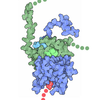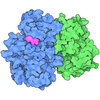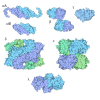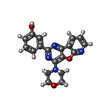| Entry | Database: PDB / ID: 4jt6
|
|---|
| Title | structure of mTORDeltaN-mLST8-PI-103 complex |
|---|
 Components Components | |
|---|
 Keywords Keywords | transferase/transferase inhibitor / kinase / transferase / transferase-transferase inhibitor complex |
|---|
| Function / homology |  Function and homology information Function and homology information
RNA polymerase III type 2 promoter sequence-specific DNA binding / RNA polymerase III type 1 promoter sequence-specific DNA binding / positive regulation of cytoplasmic translational initiation / regulation of locomotor rhythm / T-helper 1 cell lineage commitment / positive regulation of pentose-phosphate shunt / positive regulation of wound healing, spreading of epidermal cells / TORC2 signaling / TORC2 complex / regulation of membrane permeability ...RNA polymerase III type 2 promoter sequence-specific DNA binding / RNA polymerase III type 1 promoter sequence-specific DNA binding / positive regulation of cytoplasmic translational initiation / regulation of locomotor rhythm / T-helper 1 cell lineage commitment / positive regulation of pentose-phosphate shunt / positive regulation of wound healing, spreading of epidermal cells / TORC2 signaling / TORC2 complex / regulation of membrane permeability / cellular response to leucine starvation / TFIIIC-class transcription factor complex binding / heart valve morphogenesis / negative regulation of lysosome organization / TORC1 complex / voluntary musculoskeletal movement / positive regulation of transcription of nucleolar large rRNA by RNA polymerase I / calcineurin-NFAT signaling cascade / RNA polymerase III type 3 promoter sequence-specific DNA binding / positive regulation of keratinocyte migration / regulation of osteoclast differentiation / MTOR signalling / regulation of lysosome organization / cellular response to L-leucine / energy reserve metabolic process / regulation of autophagosome assembly / Energy dependent regulation of mTOR by LKB1-AMPK / cellular response to nutrient / Amino acids regulate mTORC1 / TORC1 signaling / cellular response to methionine / serine/threonine protein kinase complex / ruffle organization / negative regulation of cell size / positive regulation of ubiquitin-dependent protein catabolic process / cellular response to osmotic stress / anoikis / inositol hexakisphosphate binding / negative regulation of protein localization to nucleus / cardiac muscle cell development / negative regulation of calcineurin-NFAT signaling cascade / regulation of myelination / positive regulation of transcription by RNA polymerase III / negative regulation of macroautophagy / positive regulation of myotube differentiation / Macroautophagy / regulation of cell size / Constitutive Signaling by AKT1 E17K in Cancer / positive regulation of actin filament polymerization / germ cell development / behavioral response to pain / oligodendrocyte differentiation / positive regulation of oligodendrocyte differentiation / TOR signaling / positive regulation of translational initiation / mTORC1-mediated signalling / CD28 dependent PI3K/Akt signaling / HSF1-dependent transactivation / regulation of macroautophagy / positive regulation of TOR signaling / 'de novo' pyrimidine nucleobase biosynthetic process / response to amino acid / positive regulation of epithelial to mesenchymal transition / positive regulation of lipid biosynthetic process / vascular endothelial cell response to laminar fluid shear stress / cellular response to nutrient levels / heart morphogenesis / neuronal action potential / regulation of cellular response to heat / positive regulation of lamellipodium assembly / cardiac muscle contraction / positive regulation of stress fiber assembly / T cell costimulation / phagocytic vesicle / cytoskeleton organization / endomembrane system / negative regulation of insulin receptor signaling pathway / negative regulation of autophagy / cellular response to amino acid starvation / cellular response to starvation / positive regulation of glycolytic process / regulation of signal transduction by p53 class mediator / Regulation of PTEN gene transcription / protein serine/threonine kinase activator activity / positive regulation of translation / VEGFR2 mediated vascular permeability / post-embryonic development / TP53 Regulates Metabolic Genes / regulation of actin cytoskeleton organization / non-specific protein-tyrosine kinase / macroautophagy / cellular response to amino acid stimulus / response to nutrient levels / regulation of cell growth / phosphoprotein binding / regulation of circadian rhythm / PML body / protein destabilization / response to virus / multicellular organism growthSimilarity search - Function Target of rapamycin complex subunit LST8 / Domain of unknown function DUF3385, target of rapamycin protein / Serine/threonine-protein kinase mTOR domain / Domain of unknown function / FKBP12-rapamycin binding domain / Serine/threonine-protein kinase TOR / FKBP12-rapamycin binding domain superfamily / FKBP12-rapamycin binding domain / Rapamycin binding domain / Serine/threonine-protein kinase ATR-like, HEAT repeats ...Target of rapamycin complex subunit LST8 / Domain of unknown function DUF3385, target of rapamycin protein / Serine/threonine-protein kinase mTOR domain / Domain of unknown function / FKBP12-rapamycin binding domain / Serine/threonine-protein kinase TOR / FKBP12-rapamycin binding domain superfamily / FKBP12-rapamycin binding domain / Rapamycin binding domain / Serine/threonine-protein kinase ATR-like, HEAT repeats / : / FATC domain / PIK-related kinase, FAT / FAT domain / FATC / FATC domain / PIK-related kinase / FAT domain profile. / FATC domain profile. / Quinoprotein alcohol dehydrogenase-like superfamily / Phosphatidylinositol 3- and 4-kinases signature 1. / Phosphatidylinositol 3/4-kinase, conserved site / Phosphatidylinositol 3- and 4-kinases signature 2. / Phosphatidylinositol 3-/4-kinase, catalytic domain superfamily / Phosphoinositide 3-kinase, catalytic domain / Phosphatidylinositol 3- and 4-kinase / Phosphatidylinositol 3- and 4-kinases catalytic domain profile. / Phosphatidylinositol 3-/4-kinase, catalytic domain / YVTN repeat-like/Quinoprotein amine dehydrogenase / 7 Propeller / Methylamine Dehydrogenase; Chain H / Armadillo-like helical / Tetratricopeptide-like helical domain superfamily / WD domain, G-beta repeat / Armadillo-type fold / G-protein beta WD-40 repeat / WD40 repeat, conserved site / Trp-Asp (WD) repeats signature. / Trp-Asp (WD) repeats profile. / Trp-Asp (WD) repeats circular profile. / WD40 repeats / WD40 repeat / WD40/YVTN repeat-like-containing domain superfamily / Protein kinase-like domain superfamily / Mainly BetaSimilarity search - Domain/homology |
|---|
| Biological species |  Homo sapiens (human) Homo sapiens (human) |
|---|
| Method |  X-RAY DIFFRACTION / X-RAY DIFFRACTION /  SYNCHROTRON / SYNCHROTRON /  MOLECULAR REPLACEMENT / Resolution: 3.6 Å MOLECULAR REPLACEMENT / Resolution: 3.6 Å |
|---|
 Authors Authors | Pavletich, N.P. / Yang, H. |
|---|
 Citation Citation |  Journal: Nature / Year: 2013 Journal: Nature / Year: 2013
Title: mTOR kinase structure, mechanism and regulation.
Authors: Yang, H. / Rudge, D.G. / Koos, J.D. / Vaidialingam, B. / Yang, H.J. / Pavletich, N.P. |
|---|
| History | | Deposition | Mar 22, 2013 | Deposition site: RCSB / Processing site: RCSB |
|---|
| Revision 1.0 | May 8, 2013 | Provider: repository / Type: Initial release |
|---|
| Revision 1.1 | May 29, 2013 | Group: Database references |
|---|
| Revision 1.2 | Feb 28, 2024 | Group: Data collection / Database references / Derived calculations
Category: chem_comp_atom / chem_comp_bond ...chem_comp_atom / chem_comp_bond / database_2 / struct_site
Item: _database_2.pdbx_DOI / _database_2.pdbx_database_accession ..._database_2.pdbx_DOI / _database_2.pdbx_database_accession / _struct_site.pdbx_auth_asym_id / _struct_site.pdbx_auth_comp_id / _struct_site.pdbx_auth_seq_id |
|---|
|
|---|
 Open data
Open data Basic information
Basic information Components
Components Keywords
Keywords Function and homology information
Function and homology information Homo sapiens (human)
Homo sapiens (human) X-RAY DIFFRACTION /
X-RAY DIFFRACTION /  SYNCHROTRON /
SYNCHROTRON /  MOLECULAR REPLACEMENT / Resolution: 3.6 Å
MOLECULAR REPLACEMENT / Resolution: 3.6 Å  Authors
Authors Citation
Citation Journal: Nature / Year: 2013
Journal: Nature / Year: 2013 Structure visualization
Structure visualization Molmil
Molmil Jmol/JSmol
Jmol/JSmol Downloads & links
Downloads & links Download
Download 4jt6.cif.gz
4jt6.cif.gz PDBx/mmCIF format
PDBx/mmCIF format pdb4jt6.ent.gz
pdb4jt6.ent.gz PDB format
PDB format 4jt6.json.gz
4jt6.json.gz PDBx/mmJSON format
PDBx/mmJSON format Other downloads
Other downloads https://data.pdbj.org/pub/pdb/validation_reports/jt/4jt6
https://data.pdbj.org/pub/pdb/validation_reports/jt/4jt6 ftp://data.pdbj.org/pub/pdb/validation_reports/jt/4jt6
ftp://data.pdbj.org/pub/pdb/validation_reports/jt/4jt6 Links
Links Assembly
Assembly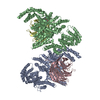
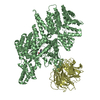
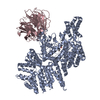
 Components
Components Homo sapiens (human) / Gene: mTOR / Plasmid: pcDNA3.1(+)hygromycin / Cell line (production host): HEK293 / Production host:
Homo sapiens (human) / Gene: mTOR / Plasmid: pcDNA3.1(+)hygromycin / Cell line (production host): HEK293 / Production host:  Homo Sapiens (human) / References: UniProt: P42345
Homo Sapiens (human) / References: UniProt: P42345 Homo sapiens (human) / Gene: mLST8 / Plasmid: pcDNA3.1(+)blasticidin / Cell line (production host): HEK293 / Production host:
Homo sapiens (human) / Gene: mLST8 / Plasmid: pcDNA3.1(+)blasticidin / Cell line (production host): HEK293 / Production host:  Homo sapiens (human) / References: UniProt: Q9BVC4
Homo sapiens (human) / References: UniProt: Q9BVC4 X-RAY DIFFRACTION / Number of used crystals: 1
X-RAY DIFFRACTION / Number of used crystals: 1  Sample preparation
Sample preparation SYNCHROTRON / Site:
SYNCHROTRON / Site:  APS
APS  / Beamline: 24-ID-E / Wavelength: 0.97918 Å
/ Beamline: 24-ID-E / Wavelength: 0.97918 Å Processing
Processing MOLECULAR REPLACEMENT / Resolution: 3.6→39.67 Å / Cor.coef. Fo:Fc: 0.897 / Cor.coef. Fo:Fc free: 0.848 / Occupancy max: 1 / Occupancy min: 1 / SU B: 36.422 / SU ML: 0.517 / Cross valid method: THROUGHOUT / σ(F): 0 / ESU R Free: 0.808 / Stereochemistry target values: MAXIMUM LIKELIHOOD / Details: U VALUES : REFINED INDIVIDUALLY
MOLECULAR REPLACEMENT / Resolution: 3.6→39.67 Å / Cor.coef. Fo:Fc: 0.897 / Cor.coef. Fo:Fc free: 0.848 / Occupancy max: 1 / Occupancy min: 1 / SU B: 36.422 / SU ML: 0.517 / Cross valid method: THROUGHOUT / σ(F): 0 / ESU R Free: 0.808 / Stereochemistry target values: MAXIMUM LIKELIHOOD / Details: U VALUES : REFINED INDIVIDUALLY Movie
Movie Controller
Controller



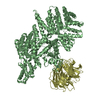
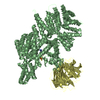
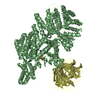
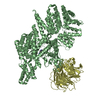
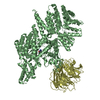
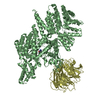
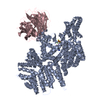
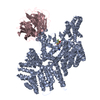
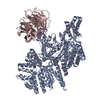
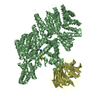
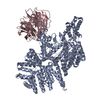
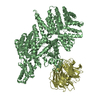
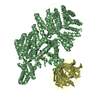
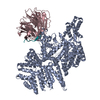
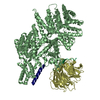
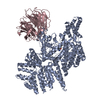
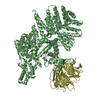
 PDBj
PDBj